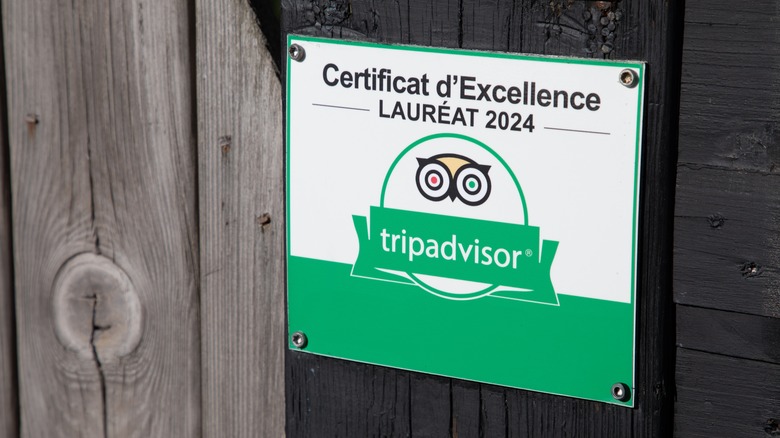Rick Steves Explains Why Tourists Shouldn't Blindly Trust Travel Review Sites
One of the most vexing and hard-to-answer questions travelers face when planning their next adventure is how to choose where to stay, where to eat, what to see, and what to do while vacationing. In our information-rich, extremely online world, working out what's legit and what's deceptive can be a tricky business. In the olden days, travelers would turn to physical guidebooks, relying on their trusty Frommer's, Lonely Planet, or Fodor's to take them from place to place and recommend the best hotels, restaurants, and attractions. However, with the proliferation of travel websites, personal blogs, video journals, and everything else, finding trustworthy recommendations can be difficult, partly because of the sheer volume of what's out there!
Confronted by so many different ways to get information about exotic travel destinations, many people turn to customer reviews to try and get accurate, authentic, and trustworthy insights. It's easy to see why sites like TripAdvisor, TrustPilot, and Google are popular. They give you access to the thoughts and opinions of real people who have already visited a destination, eaten at a restaurant, or spent the night at a hotel, and so can offer genuine, first-hand experience, insight, and advice.
However, according to travel expert Rick Steves, relying too much on online reviews isn't always the best way to go. According to Steves, although "user-generated travel review websites — such as Tripadvisor, Booking.com, and Yelp — have quickly become huge players in the travel industry", they aren't infallible, and you should think twice before trusting reviews from Tripadvisor and similar sites.
Biased reviews and the 'echo chamber' phenomenon
The main problem that Steves identifies with review sites is that while they give the impression of being genuine, unbiased reviews, all too often, they are anything but. Steves says his hunch "is that a significant percentage of user reviews are posted by friends or enemies of the business being reviewed". This means that whether it's five stars or one star, the rating might be motivated by something other than the experience itself.
Steves also worries the importance of reviews may also lead to businesses changing their behavior in order to manipulate guests into rating them well. While this might just mean improving the overall service or experience, it can be less positive too. Steves says that he finds "more and more small hotels offering a free breakfast to people who promise to write kindly about them on TripAdvisor", a habit which leads to untrustworthy reviews. The problem goes the other way too, with "several hoteliers [saying] that occasionally guests threaten them with a bad review unless the hotel gives them a big discount".
Even when reviews aren't manipulated, the basic function of these sites means they aren't always offering the most interesting or useful advice. Steves points out that "review sites can become an echo chamber, where one or two well-located, flashy businesses camp out atop the ratings. Travelers use it, like it, and rave about it, creating a self-perpetuating cycle of positive reviews". This means that the places that get the most reviews will always keep getting more reviews, and it can be hard for smaller spots to break through. Steves says that this is why "review sites" restaurant recommendations skew to very touristy, obvious options".
How to use reviews effectively
None of this is to say that review sites are inherently bad. Steves admits he uses them himself, and says that "[they] can be an invaluable tool for planning a trip". But he feels it's important to think before blindly trusting what they have to say, and to remember that "review sites are only as good as the judgment of their reviewers. And someone reviewing a hotel can't judge it on a curve because, in most cases, they've only experienced that one hotel in that town". He isn't rejecting them as useless, just advising travelers to be cautious, even of highly-rated restaurants and hotels.
Ultimately, the best way to use review sites is alongside something more traditional, like a guidebook or reputable travel blog. Steves says that he sees review websites "as a perfect complement to a thoughtfully updated guidebook".
The best approach is to do a little research on your own, and take a look at a couple guidebooks. Once you've got some ideas, take a look at the reviews to narrow down your options. As Steves says, "if a hotel or restaurant is well-reviewed in a guidebook or two, and also gets good ratings on one of these sites, it's likely a winner."


